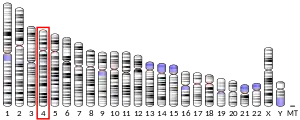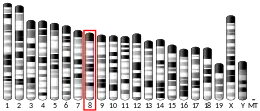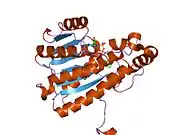Hydroxyprostaglandin dehydrogenase 15-(NAD) (the HUGO-approved official symbol = HPGD; HGNC ID, HGNC:5154), also called 15-hydroxyprostaglandin dehydrogenase [NAD+], is an enzyme that in humans is encoded by the HPGD gene.[5][6]
In melanocytic cells HPGD gene expression may be regulated by MITF.[7]
Functions
15-hydroxy prostaglandin dehydrogenase (HPGD) is an enzyme belongs to the family of oxidoreductases, specifically the short chain dehydrogenase/reductase family 36C member 1.[8] This protein coding gene encodes a member of the short chain alcohol dehydrogenase protein family.[9] HPGD catalyzes the first step in the catabolic pathway of prostaglandins and is therefore responsible for the metabolic/catabolic inactivation of prostaglandins.[10] This inactivation process will oxidize the 15-hydroxyl group of prostaglandins and yield the corresponding 15-keto (oxo) metabolite.[11]
Prostaglandins have a critical role in the signaling pathways that are involved in reproduction (establishment of pregnancy, maintenance of pregnancy, and initiation of labor), blood pressure homeostasis (vasoconstriction and vasodilation), sexual dimorphism, and the immune system (inflammation).[12][13][14][15][16] HPGD has a critical role in the regulation of prostaglandin expression.
Expression
HPGD RNA-seq was performed in tissue samples from 95 human individuals representing 27 different tissues to determine tissue-specificity of all protein-coding genes.[17] HPGD was expressed in the adrenal, appendix, bone marrow, brain, colon, duodenum, endometrium, esophagus, fat, gall bladder, heart, kidney, liver, lung, lymph node, ovary, pancreas, placenta, prostate, salivary gland, skin, small intestine, spleen, stomach, testis, thyroid, urinary bladder
Defects in 15-HPGD
15-HPGD has an unappreciated role in the maintenance of pregnancy. In mice, 15-HPDG has been shown to have essential roles in prevention of early termination of pregnancy and maternal morbidity.[18] In 15-HPGD knockout mice, early pregnancy termination was detected. 15-HPGD KO mice that were able to establish pregnancy, lost pregnancy by gestation day ~8.5. At time of pregnancy loss, 15-HPGD KO mice have normal levels of PGE2, increased levels of PGF2α and decreasing levels of serum progesterone.[18]
A hypomorphic mutation of 15-HPGD causes mice to enter labor ~ a full day earlier when compared to their wild-type littermates, due to elevated circulating PGF2α concentrations. Furthermore, it was concluded that 15-HPGD has a critical role in determining the timing of labor[19]
See also
References
- 1 2 3 GRCh38: Ensembl release 89: ENSG00000164120 - Ensembl, May 2017
- 1 2 3 GRCm38: Ensembl release 89: ENSMUSG00000031613 - Ensembl, May 2017
- ↑ "Human PubMed Reference:". National Center for Biotechnology Information, U.S. National Library of Medicine.
- ↑ "Mouse PubMed Reference:". National Center for Biotechnology Information, U.S. National Library of Medicine.
- ↑ Persson B, Kallberg Y, Bray JE, Bruford E, Dellaporta SL, Favia AD, Duarte RG, Jornvall H, Kavanagh KL, Kedishvili N, Kisiela M, Maser E, Mindnich R, Orchard S, Penning TM, Thornton JM, Adamski J, Oppermann U (Feb 2009). "The SDR (short-chain dehydrogenase/reductase and related enzymes) nomenclature initiative". Chem Biol Interact. 178 (1–3): 94–8. doi:10.1016/j.cbi.2008.10.040. PMC 2896744. PMID 19027726.
- ↑ "Entrez Gene: HPGD hydroxyprostaglandin dehydrogenase 15-(NAD)".
- ↑ Hoek KS, Schlegel NC, Eichhoff OM, et al. (2008). "Novel MITF targets identified using a two-step DNA microarray strategy". Pigment Cell Melanoma Res. 21 (6): 665–76. doi:10.1111/j.1755-148X.2008.00505.x. PMID 19067971. S2CID 24698373.
- ↑ "HPGD Gene - GeneCards | PGDH Protein | PGDH Antibody". www.genecards.org. Retrieved 2023-04-17.
- ↑ "HPGD 15-hydroxyprostaglandin dehydrogenase [Homo sapiens (human)] - Gene - NCBI". www.ncbi.nlm.nih.gov. Retrieved 2023-04-17.
- ↑ Parent, M., Madore, E., MacLaren, L. A., & Fortier, M. A. (2006). 15-Hydroxyprostaglandin dehydrogenase in the bovine endometrium during the oestrous cycle and early pregnancy. Reproduction, 131(3), 573-582.
- ↑ Ensor, C. M.; Tai, H. H. (1994-09-21). "Bacterial expression and site-directed mutagenesis of two critical residues (tyrosine-151 and lysine-155) of human placental NAD(+)-dependent 15-hydroxyprostaglandin dehydrogenase". Biochimica et Biophysica Acta (BBA) - Protein Structure and Molecular Enzymology. 1208 (1): 151–156. doi:10.1016/0167-4838(94)90172-4. ISSN 0006-3002. PMID 8086429.
- ↑ Hizaki, H. et al. Abortive expansion of the cumulus and impaired fertility in mice lacking the prostaglandin E receptor subtype EP(2). Proceedings of the National Academy of Sciences of the United States of America 96, 10501–10506 (1999).
- ↑ Kobayashi, T. & Narumiya, S. Function of prostanoid receptors: studies on knockout mice. Prostaglandins & other lipid mediators 68-69, 557–573 (2002).
- ↑ Lim, H. et al. Multiple female reproductive failures in cyclooxygenase 2-defcient mice. Cell 91, 197–208 (1997).
- ↑ Murata, T. et al. Altered pain perception and infammatory response in mice lacking prostacyclin receptor. Nature 388, 678–682 (1997).
- ↑ Tomas, D. W. et al. Coagulation defects and altered hemodynamic responses in mice lacking receptors for thromboxane A2. The Journal of clinical investigation 102, 1994–2001 (1998).
- ↑ "HPGD Gene Expression - Gene - NCBI". www.ncbi.nlm.nih.gov. Retrieved 2023-04-17.
- 1 2 Roizen, J. D., Asada, M., Tong, M., Tai, H. H., & Muglia, L. J. (2019). Early pregnancy loss in 15-hydroxyprostaglandin dehydrogenase knockout (15-HPGD−/−) mice due to requirement for embryo 15-HPGD activity. Scientific Reports, 9(1), 1-9.
- ↑ Roizen, J. D. (2008). 15-hydroxyprostaglandin dehydrogenase in mouse pregnancy and parturition (Order No. 3316671). Available from Health Research Premium Collection; ProQuest Dissertations & Theses Global. (304442244).
Further reading
- Erwich JJ, Keirse MJ (1992). "Placental localization of 15-hydroxy-prostaglandin dehydrogenase in early and term human pregnancy". Placenta. 13 (3): 223–9. doi:10.1016/0143-4004(92)90037-T. PMID 1635910.
- Ensor CM, Yang JY, Okita RT, Tai HH (1990). "Cloning and sequence analysis of the cDNA for human placental NAD(+)-dependent 15-hydroxyprostaglandin dehydrogenase". J. Biol. Chem. 265 (25): 14888–91. doi:10.1016/S0021-9258(18)77199-8. PMID 1697582.
- Ensor CM, Tai HH (1991). "Site-directed mutagenesis of the conserved tyrosine 151 of human placental NAD(+)-dependent 15-hydroxyprostaglandin dehydrogenase yields a catalytically inactive enzyme". Biochem. Biophys. Res. Commun. 176 (2): 840–5. doi:10.1016/S0006-291X(05)80262-1. PMID 2025296.
- Krook M, Marekov L, Jörnvall H (1990). "Purification and structural characterization of placental NAD(+)-linked 15-hydroxyprostaglandin dehydrogenase. The primary structure reveals the enzyme to belong to the short-chain alcohol dehydrogenase family". Biochemistry. 29 (3): 738–43. doi:10.1021/bi00455a021. PMID 2337593.
- Pichaud F, Frendo JL, Delage-Mourroux R, et al. (1995). "Sequence of a novel mRNA coding for a C-terminal-truncated form of human NAD(+)-dependent 15-hydroxyprostaglandin dehydrogenase". Gene. 162 (2): 319–22. doi:10.1016/0378-1119(95)00319-2. PMID 7557451.
- Sangha RK, Walton JC, Ensor CM, et al. (1994). "Immunohistochemical localization, messenger ribonucleic acid abundance, and activity of 15-hydroxyprostaglandin dehydrogenase in placenta and fetal membranes during term and preterm labor". J. Clin. Endocrinol. Metab. 78 (4): 982–9. doi:10.1210/jcem.78.4.8157731. PMID 8157731.
- Krook M, Ghosh D, Duax W, Jörnvall H (1993). "Three-dimensional model of NAD(+)-dependent 15-hydroxyprostaglandin dehydrogenase and relationships to the NADP(+)-dependent enzyme (carbonyl reductase)". FEBS Lett. 322 (2): 139–42. doi:10.1016/0014-5793(93)81554-D. PMID 8482380. S2CID 21034160.
- Pichaud F, Delage-Mourroux R, Pidoux E, et al. (1997). "Chromosomal localization of the type-I 15-PGDH gene to 4q34-q35". Hum. Genet. 99 (2): 279–81. doi:10.1007/s004390050354. PMID 9048936. S2CID 6220018.
- Delage-Mourroux R, Pichaud F, Frendo JL, et al. (1997). "Cloning and sequencing of a new 15-hydroxyprostaglandin dehydrogenase related mRNA". Gene. 188 (1): 143–8. doi:10.1016/S0378-1119(96)00800-1. PMID 9099873.
- Patel FA, Clifton VL, Chwalisz K, Challis JR (1999). "Steroid regulation of prostaglandin dehydrogenase activity and expression in human term placenta and chorio-decidua in relation to labor". J. Clin. Endocrinol. Metab. 84 (1): 291–9. doi:10.1210/jcem.84.1.5399. PMID 9920098.
- Zhou H, Tai HH (1999). "Threonine 188 is critical for interaction with NAD+ in human NAD+-dependent 15-hydroxyprostaglandin dehydrogenase". Biochem. Biophys. Res. Commun. 257 (2): 414–7. doi:10.1006/bbrc.1999.0356. PMID 10198228.
- Greenland KJ, Jantke I, Jenatschke S, et al. (2000). "The human NAD+-dependent 15-hydroxyprostaglandin dehydrogenase gene promoter is controlled by Ets and activating protein-1 transcription factors and progesterone". Endocrinology. 141 (2): 581–97. doi:10.1210/endo.141.2.7313. PMID 10650939.
- Conner CE, Kelly RW, Hume R (2001). "Regulation of prostaglandin availability in human fetal lung by differential localisation of prostaglandin H synthase-1 and prostaglandin dehydrogenase". Histochem. Cell Biol. 116 (4): 313–9. doi:10.1007/s004180100323. PMID 11702189. S2CID 13199767.
- Giannoulias D, Patel FA, Holloway AC, et al. (2002). "Differential changes in 15-hydroxyprostaglandin dehydrogenase and prostaglandin H synthase (types I and II) in human pregnant myometrium". J. Clin. Endocrinol. Metab. 87 (3): 1345–52. doi:10.1210/jcem.87.3.8317. PMID 11889207.
- Cho H, Tai HH (2003). "Threonine 11 of human NAD(+)-dependent 15-hydroxyprostaglandin dehydrogenase may interact with NAD(+) during catalysis". Prostaglandins Leukot. Essent. Fatty Acids. 66 (5–6): 505–9. doi:10.1054/plef.2002.0391. PMID 12144871.
- Strausberg RL, Feingold EA, Grouse LH, et al. (2003). "Generation and initial analysis of more than 15,000 full-length human and mouse cDNA sequences". Proc. Natl. Acad. Sci. U.S.A. 99 (26): 16899–903. Bibcode:2002PNAS...9916899M. doi:10.1073/pnas.242603899. PMC 139241. PMID 12477932.
- Tai HH, Ensor CM, Zhou H, Yan F (2002). "Structure and Function of Human Nad+-Linked 15-Hydroxyprostaglandin Dehydrogenase". Eicosanoids and Other Bioactive Lipids in Cancer, Inflammation, and Radiation Injury, 5. Advances in Experimental Medicine and Biology. Vol. 507. pp. 245–50. doi:10.1007/978-1-4615-0193-0_37. ISBN 978-1-4613-4960-0. PMID 12664592.
- McKeown KJ, Challis JR (2003). "Regulation of 15-hydroxy prostaglandin dehydrogenase by corticotrophin-releasing hormone through a calcium-dependent pathway in human chorion trophoblast cells". J. Clin. Endocrinol. Metab. 88 (4): 1737–41. doi:10.1210/jc.2002-021369. PMID 12679466.
- Patel FA, Funder JW, Challis JR (2003). "Mechanism of cortisol/progesterone antagonism in the regulation of 15-hydroxyprostaglandin dehydrogenase activity and messenger ribonucleic acid levels in human chorion and placental trophoblast cells at term". J. Clin. Endocrinol. Metab. 88 (6): 2922–33. doi:10.1210/jc.2002-021710. PMID 12788907.
- Nandy A, Jenatschke S, Hartung B, et al. (2004). "Genomic structure and transcriptional regulation of the human NAD+-dependent 15-hydroxyprostaglandin dehydrogenase gene". J. Mol. Endocrinol. 31 (1): 105–21. doi:10.1677/jme.0.0310105. PMID 12914529.








